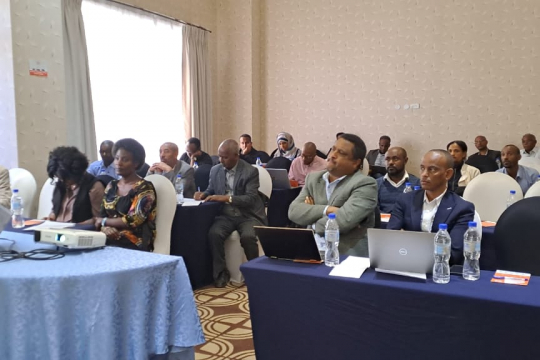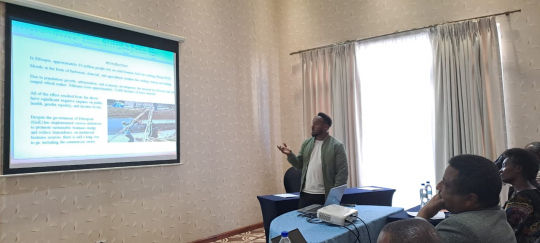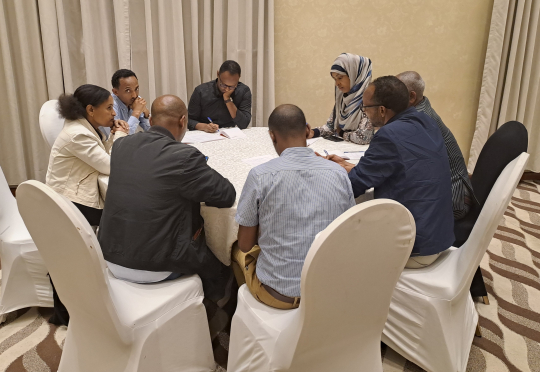EfD Ethiopia hosted a workshop on January 16 with senior civil servants, policymakers, researchers, and NGO experts to discuss energy efficiency and reduced emissions to ensure a sustainable energy transition in Ethiopia. The workshop, part of the Inclusive Green Economy (IGE) in Practice program, recognized the pressing need to shift towards sustainable energy, viewing it as a catalyst for economic, social, and environmental development.
Dr. Abebe Damte, Director of the Environment and Climate Research Center (ECRC) and EfD Ethiopia emphasized the importance of addressing energy efficiency and reducing emissions to achieve a sustainable energy transition in Ethiopia. Acknowledging the existing national challenges, he highlights the need for collective responsibility to drive change, leveraging the country’s abundant natural resources for clean energy. In addition, he emphasized the need for holistic approaches, partnerships, and active stakeholder engagement for a sustainable transition, urging collaboration to shape innovative solutions. More specifically, he stressed the need to discuss the challenges faced by the commercial sectors, such as restaurants, in the energy transition process.
Cost, technology, and culture are obstacles
Alelegn Andualem, representing the 2024 IGE fellows, presented the existing reliance on biomass fuels in Ethiopia's commercial sectors. Despite governmental efforts to promote more sustainable biomass energy and reduce traditional biomass dependency, the commercial sector continues to rely heavily on biomass sources, with the food and beverage industry being a major consumer. He highlighted energy reliability, economic considerations favoring cheap biomass resources over costly alternatives, low technological advancements, and cultural preferences for traditional cooking methods as the main obstacles for a green transition. Alelegn Andualem underscored the importance of enhancing energy efficiency to boost economic activity, reduce environmental degradation, promote innovation, cut costs, and mitigate health risks. Finally, he emphasized the need for a sustainable transition and effective policies to address these challenges in the commercial sector.
Suggested policies to address energy issues
Zewge Worku, Director of Energy Efficiency and Conservation Directorate at the Petroleum and Energy Authority (PEA), highlighted the status of energy efficiency, key challenges, and policies in Ethiopia. He underscored the pressing need to enhance energy efficiency in the country amidst increasing energy demands. He also talked about the government’s effort to implement robust policies and strategies to promote energy efficiency across various sectors, including incentive programs, awareness campaigns, and the promotion of clean energy technologies. These actions aim to curb energy waste, foster sustainable practices, and ensure a reliable energy supply for the nation's development.
Following the presentations, the participants discussed different solutions to improve energy efficiency and reduce emissions in the commercial and service sectors. Some of the proposed solutions include:
- Incentive programs and financial support (subsidy, tax exemption, loan packages mainly on initial investment)
- Introduce a strong policy and legal framework
- Promote innovation, research, and development
- Awareness building, knowledge transfer, and capacity building
- Enhancing monitoring and evaluation systems to track the effectiveness of clean energy initiatives
- Promote institutional clean cooking technology and infrastructure development
- Enhance stakeholder engagement
- Introduce quality assurance and standards certification for cooking technologies
The workshop provided a platform for collaborative discussions, knowledge exchange, and the development of innovative solutions to drive Ethiopia towards a sustainable energy future.
By: Asaye Ketema


